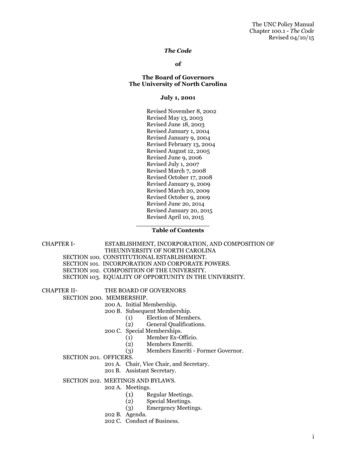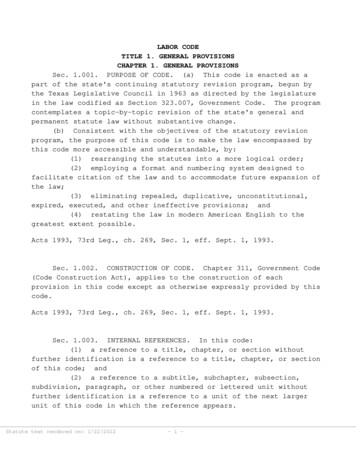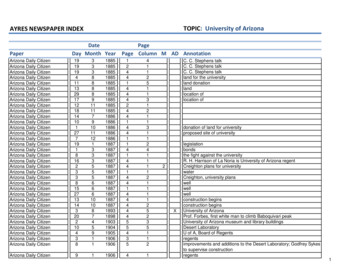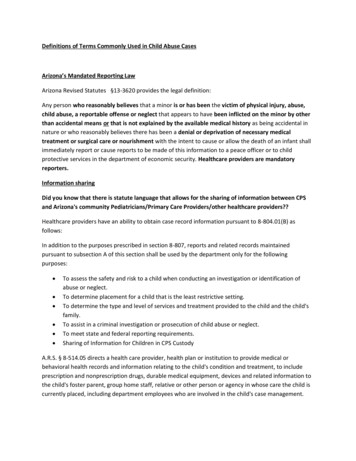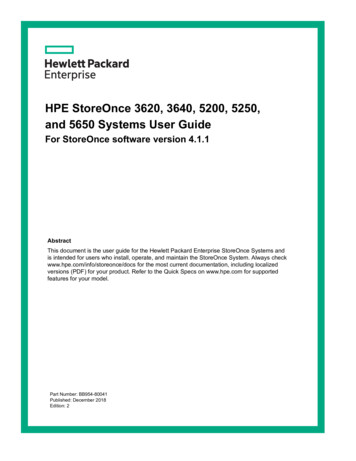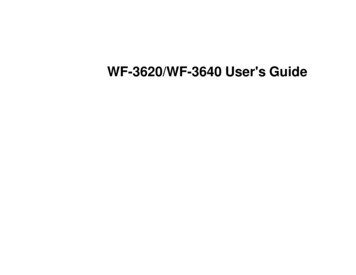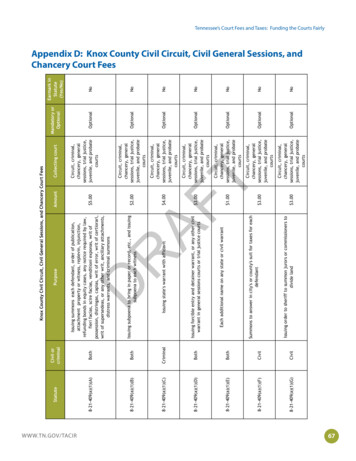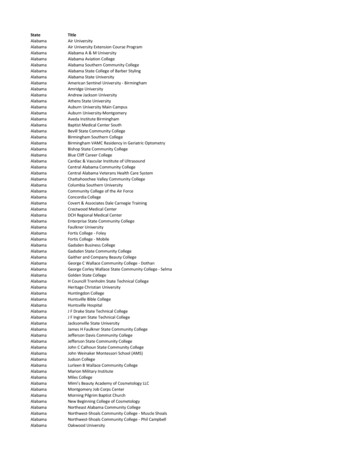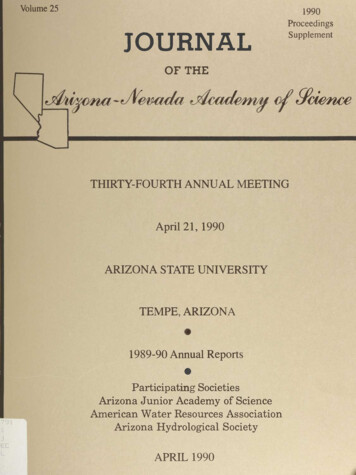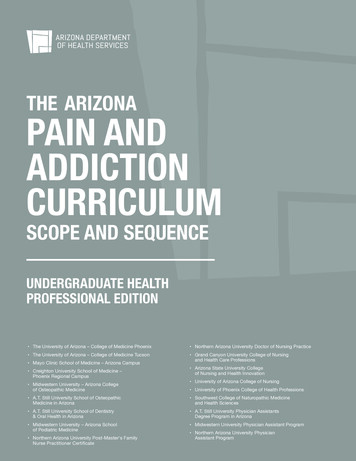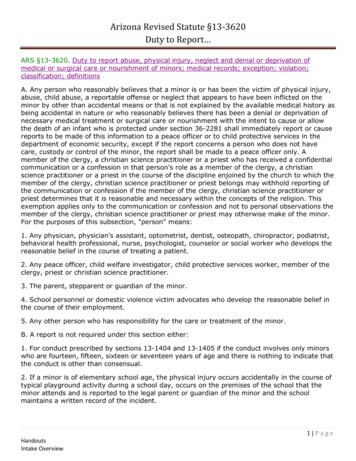
Transcription
Arizona Revised Statute §13-3620Duty to Report ARS §13-3620. Duty to report abuse, physical injury, neglect and denial or deprivation ofmedical or surgical care or nourishment of minors; medical records; exception; violation;classification; definitionsA. Any person who reasonably believes that a minor is or has been the victim of physical injury,abuse, child abuse, a reportable offense or neglect that appears to have been inflicted on theminor by other than accidental means or that is not explained by the available medical history asbeing accidental in nature or who reasonably believes there has been a denial or deprivation ofnecessary medical treatment or surgical care or nourishment with the intent to cause or allowthe death of an infant who is protected under section 36-2281 shall immediately report or causereports to be made of this information to a peace officer or to child protective services in thedepartment of economic security, except if the report concerns a person who does not havecare, custody or control of the minor, the report shall be made to a peace officer only. Amember of the clergy, a christian science practitioner or a priest who has received a confidentialcommunication or a confession in that person's role as a member of the clergy, a christianscience practitioner or a priest in the course of the discipline enjoined by the church to which themember of the clergy, christian science practitioner or priest belongs may withhold reporting ofthe communication or confession if the member of the clergy, christian science practitioner orpriest determines that it is reasonable and necessary within the concepts of the religion. Thisexemption applies only to the communication or confession and not to personal observations themember of the clergy, christian science practitioner or priest may otherwise make of the minor.For the purposes of this subsection, "person" means:1. Any physician, physician's assistant, optometrist, dentist, osteopath, chiropractor, podiatrist,behavioral health professional, nurse, psychologist, counselor or social worker who develops thereasonable belief in the course of treating a patient.2. Any peace officer, child welfare investigator, child protective services worker, member of theclergy, priest or christian science practitioner.3. The parent, stepparent or guardian of the minor.4. School personnel or domestic violence victim advocates who develop the reasonable belief inthe course of their employment.5. Any other person who has responsibility for the care or treatment of the minor.B. A report is not required under this section either:1. For conduct prescribed by sections 13-1404 and 13-1405 if the conduct involves only minorswho are fourteen, fifteen, sixteen or seventeen years of age and there is nothing to indicate thatthe conduct is other than consensual.2. If a minor is of elementary school age, the physical injury occurs accidentally in the course oftypical playground activity during a school day, occurs on the premises of the school that theminor attends and is reported to the legal parent or guardian of the minor and the schoolmaintains a written record of the incident.1 PageHandoutsIntake Overview
Arizona Revised Statute §13-3620Duty to Report C. If a physician, psychologist or behavioral health professional receives a statement from aperson other than a parent, stepparent, guardian or custodian of the minor during the course ofproviding sex offender treatment that is not court ordered or that does not occur while theoffender is incarcerated in the state department of corrections or the department of juvenilecorrections, the physician, psychologist or behavioral health professional may withhold thereporting of that statement if the physician, psychologist or behavioral health professionaldetermines it is reasonable and necessary to accomplish the purposes of the treatment.D. Reports shall be made immediately either electronically or by telephone. The reports shallcontain the following information, if known:1. The names and addresses of the minor and the minor's parents or the person or personshaving custody of the minor.2. The minor's age and the nature and extent of the minor's abuse, child abuse, physical injuryor neglect, including any evidence of previous abuse, child abuse, physical injury or neglect.3. Any other information that the person believes might be helpful in establishing the cause ofthe abuse, child abuse, physical injury or neglect.E. A health care professional who is regulated pursuant to title 32 and who, after a routinenewborn physical assessment of a newborn infant's health status or following notification ofpositive toxicology screens of a newborn infant, reasonably believes that the newborn infant maybe affected by the presence of alcohol or a drug listed in section 13-3401 shall immediatelyreport this information, or cause a report to be made, to child protective services in thedepartment of economic security. For the purposes of this subsection, "newborn infant" means anewborn infant who is under thirty days of age.F. Any person other than one required to report or cause reports to be made under subsection Aof this section who reasonably believes that a minor is or has been a victim of abuse, childabuse, physical injury, a reportable offense or neglect may report the information to a peaceofficer or to child protective services in the department of economic security, except if the reportconcerns a person who does not have care, custody or control of the minor, the report shall bemade to a peace officer only.G. A person who has custody or control of medical records of a minor for whom a report isrequired or authorized under this section shall make the records, or a copy of the records,available to a peace officer, child welfare investigator or child protective services workerinvestigating the minor's neglect, child abuse, physical injury or abuse on written request for therecords signed by the peace officer, child welfare investigator or child protective services worker.Records disclosed pursuant to this subsection are confidential and may be used only in a judicialor administrative proceeding or investigation resulting from a report required or authorizedunder this section.H. When reports are received by a peace officer, the officer shall immediately notify childprotective services in the department of economic security and make the information availableto child protective services. Notwithstanding any other statute, when child protective services2 PageHandoutsIntake Overview
Arizona Revised Statute §13-3620Duty to Report receives these reports, it shall immediately notify a peace officer in the appropriate jurisdictionand the office of child welfare investigations in the department of economic security.I. Any person who is required to receive reports pursuant to subsection A of this section maytake or cause to be taken photographs of the minor and the vicinity involved. Medicalexaminations of the involved minor may be performed.J. A person who furnishes a report, information or records required or authorized under thissection, or a person who participates in a judicial or administrative proceeding or investigationresulting from a report, information or records required or authorized under this section, isimmune from any civil or criminal liability by reason of that action unless the person acted withmalice or unless the person has been charged with or is suspected of abusing or neglecting thechild or children in question.K. Except for the attorney client privilege or the privilege under subsection L of this section, noprivilege applies to any:1. Civil or criminal litigation or administrative proceeding in which a minor's neglect,dependency, abuse, child abuse, physical injury or abandonment is an issue.2. Judicial or administrative proceeding resulting from a report, information or records submittedpursuant to this section.3. Investigation of a minor's child abuse, physical injury, neglect or abuse conducted by a peaceofficer or child protective services in the department of economic security.L. In any civil or criminal litigation in which a child's neglect, dependency, physical injury, abuse,child abuse or abandonment is an issue, a member of the clergy, a christian science practitioneror a priest shall not, without his consent, be examined as a witness concerning any confessionmade to him in his role as a member of the clergy, a christian science practitioner or a priest inthe course of the discipline enjoined by the church to which he belongs. This subsection does notdischarge a member of the clergy, a christian science practitioner or a priest from the duty toreport pursuant to subsection A of this section.M. If psychiatric records are requested pursuant to subsection G of this section, the custodian ofthe records shall notify the attending psychiatrist, who may excise from the records, before theyare made available:1. Personal information about individuals other than the patient.2. Information regarding specific diagnosis or treatment of a psychiatric condition, if theattending psychiatrist certifies in writing that release of the information would be detrimental tothe patient's health or treatment.N. If any portion of a psychiatric record is excised pursuant to subsection M of this section, acourt, on application of a peace officer, child welfare investigator or child protective servicesworker, may order that the entire record or any portion of the record that contains informationrelevant to the reported abuse, child abuse, physical injury or neglect be made available to the3 PageHandoutsIntake Overview
Arizona Revised Statute §13-3620Duty to Report peace officer, child welfare investigator or child protective services worker investigating theabuse, child abuse, physical injury or neglect.O. A person who violates this section is guilty of a class 1 misdemeanor, except if the failure toreport involves a reportable offense, the person is guilty of a class 6 felony.P. For the purposes of this section:1. "Abuse" has the same meaning prescribed in section 8-201.2. "Child abuse" means child abuse pursuant to section 13-3623.3. "Neglect" has the same meaning prescribed in section 8-201.4. "Reportable offense" means any of the following:(a) Any offense listed in chapters 14 and 35.1 of this title or section 13-3506.01.(b) Surreptitious photographing, videotaping, filming or digitally recording or viewing a minorpursuant to section 13-3019.(c) Child prostitution pursuant to section 13-3212.(d) Incest pursuant to section 13-3608.4 PageHandoutsIntake Overview
Arizona Child Abuse HotlineLegal and Applied Definitions of AbuseLegal and Applied Definition of Abuse: (A.R.S. § 8-201)“Abuse” is defined in A.R.S. § 8-201(2) as “the infliction of or allowing of physical injury,impairment of bodily function or disfigurement or the infliction of or allowing another person tocause serious emotional damage as evidenced by severe anxiety, depression, withdrawal oruntoward aggressive behavior and which emotional damage is diagnosed by a medical doctor orpsychologist and is caused by the acts or omissions of an individual having care, custody andcontrol of a child. Abuse includes:(a) Inflicting or allowing sexual abuse pursuant to section 13-1404, sexual conduct with a minorpursuant to section 13-1405, sexual assault pursuant to section 13-1406, molestation of achild pursuant to section 13-1410, commercial sexual exploitation of a minor pursuant tosection 13-3552, sexual exploitation of a minor pursuant to section13-3553, incest pursuantto section 13-3608 or child prostitution pursuant to section 13-3212.(b) Physical injury that results from permitting a child to enter or remain in any structure orvehicle in which volatile, toxic or flammable chemicals are found or equipment is possessedby any person for the purpose of manufacturing a dangerous drug as defined in section 133401.(c) Unreasonable confinement of a child.”Confinement means the restriction of movement or confining a child to an enclosed areaand/or using a threat of harm or intimidation to force a child to remain in a location orposition.Confinement is unreasonable if, taking into account the totality of the circumstances, theconfinement is such that a reasonable (ordinarily cautious) parent, guardian or custodianwould not use that method of confinement. The totality of the circumstances includesconsideration of the child’s age, developmental and cognitive functioning and any specialneeds such as mental illness, behavioral health, physical limitations, and length ofconfinement.Examples of unreasonable confinement may include but are not limited to: tying a child’s arm’s or legs together, or binding (tying) a child to a chair, bed, tree, or other object, or locking a child in a cage.Locking a child in a bedroom, closet, or shed may be unreasonable confinement, taking intoaccount the totality of the circumstances, such as the length of time, whether the child wasdeprived of food, water, access to a bathroom or had no means to leave in the event of anemergency.5 PageHandoutsIntake Overview
Arizona Child Abuse HotlineLegal and Applied Definitions of Abuse“Serious physical injury” is defined in A.R.S. § 8-201(30) as “an injury that is diagnosed by amedical doctor and that does any one or a combination of the following:a.b.c.d.e.creates a reasonable risk of deathcauses serious or permanent disfigurementcauses significant physical paincauses serious impairment of healthcauses loss or protracted impairment of an organ or limb.”“Physical injury” is defined in A.R.S. § 13-3623(f)(4) as “the impairment of physical conditionand includes (but shall not be limited to any):a.b.c.d.e.f.skin bruisingpressure soresbleedingfailure to thrivemalnutritiondehydrationi.l.g.burnsh.fracture of any bonesubdural hematomaj.soft tissue swellingk.injury to any internal organphysical condition which imperilshealth or welfare”Applied Definition of Physical Abuse (according to Exhibit 11 SubstantiationGuidelines)Physical injury is the impairment of a physical condition and includes: skin bruising including bruising to the corners of the mouth which may indicate thatthe child was gagged, pressure sores, bleeding, failure to thrive or pediatric undernourishment (requires medical diagnosis), malnutrition (requires medical diagnosis), dehydration (requires medical diagnosis), burns, which may include water burns, rope burns, rug burns and other abrasions, subdural hematoma (requires medical diagnosis), soft tissue swelling, which may include bald patches where hair has been pulled out,bite demarcation, and welts such as from cords or other objects, injury to any internal organ (requires medical diagnosis), or any physical condition which imperils a child's health or welfare.6 PageHandoutsIntake Overview
Arizona Child Abuse HotlineLegal and Applied Definitions of AbuseSex Related Forms of Abuse1.Sexual Abuse means knowingly or intentionally engaging in Sexual contact with a child 15 years of age or older without their consent. NOTE: If a child over 15 years of age consents to the touching it does not meet thedefinition of sexual abuse. However, such activity may qualify as a form ofneglect. Sexual contact with the breast of any female child under 15 years of age regardless ofconsent NOTE: If a child is under 15 years of age, then sexual contact with any part of thechild’s body other than the female breast is “child molestation” which is listedbelow.2.Sexual Conduct with a Minor means intentionally or knowingly engaging in sexualintercourse or oral sexual contact with any person who is under eighteen years of age. Thisincludes both the case when a child consents to the activity and when the child does notconsent. However, when the child does not consent it fits more appropriately under “sexualassault” listed below.3.Sexual Assault means intentionally or knowingly engaging in sexual intercourse or oralsexual contact with any person (including a child) without consent of such person.4.Molestation of a Child means intentionally or knowingly engaging in or causing a personto engage in sexual contact (except sexual contact with the female breast which is coveredin sexual abuse above) with a child under fifteen years of age.5.Commercial Sexual Exploitation of a Minor means knowingly: Using, employing, persuading, enticing, inducing or coercing a minor to engage in orassist others to engage in exploitative exhibition or other sexual conduct for thepurpose of producing any visual or print medium or live act depicting such conduct. Using, employing, persuading, enticing, inducing or coercing a minor to expose thegenitals or anus or the areola or nipple of the female breast for financial or commercialgain. Permitting a minor under such person's custody or control to engage in or assist othersto engage in exploitative exhibition or other sexual conduct for the purpose ofproducing any visual or print medium or live act depicting such conduct. Transporting or financing the transportation of any minor through or across the statewith the intent that such minor engage in prostitution, exploitative exhibition or othersexual conduct for the purpose of producing a visual or print medium or live actdepicting such conduct.6. Sexual exploitation of a minor means knowingly: Recording, filming, photographing, developing or duplicating any visual or printmedium in which minors are engaged in exploitative exhibition or other sexualconduct.7 PageHandoutsIntake Overview
Distributing, transporting, exhibiting, receiving, selling, purchasing, possessing orengaging in any visual or print medium in which minors are engaged in exploitativeexhibition or other sexual conduct.7. Incest means to knowingly marry or commit fornication with a person (in this case a child)who is within the degree of consanguinity, within which marriages are declared by law to beincestuous and void. Void marriages are those between: Parents and their children Between siblings of ½ or whole blood relation Grandparents and their grandchildren Uncles and their nieces OR Aunts and their nephews Between first cousins8. Child Prostitution A person commits child prostitution by knowingly:Causing any minor to engage in prostitution or engaging in prostitution with a minor;Using any minor for purposes of prostitution;Permitting a minor under such person' custody or control to engage in prostitution;Receiving any benefit for or on account of procuring or placing a minor in place or incharge or custody of any person for the purpose of prostitution;Receiving any benefit pursuant to an agreement to participate in the proceeds ofprostitution of a minor;Financing, managing, supervising, controlling or owning either alone or in associationwith others prostitution activity involving a minor;Transporting or financing the transportation of any minor through or across the statewith the intent that such minor engage in prostitution;DEFINITIONS FOR SEX RELATED FORMS OF ABUSEFor purposes of the above sex related forms of abuse, the following definitions apply:Exploitative Exhibition means the actual or simulated exhibition of the genitals or pubic orrectal areas of any person for the purpose of sexual stimulation of the viewer.Fondling means direct or indirect touching or manipulating, whether above or under clothing, ofany part of the genitals, anus or female breast, by any part of a person's body or by any object.Masturbation means an act of self-stimulation with any part of the body or object.Oral Sexual Contact means oral contact with the penis, vulva anus.Producing means financing, directing, manufacturing, issuing, publishing, or advertising forpecuniary gain.Prostitution means engaging in or agreeing or offering to engage in sexual conduct with anyperson under a fee arrangement with that person or any other person;Sadomasochistic Abuse means flagellation or torture by or upon a person who is nude or cladin undergarments or in revealing or bizarre costume or the condition of being fettered, bound orotherwise physically restrained on the part of one so clothed.8 PageHandoutsIntake Overview
Arizona Child Abuse HotlineLegal and Applied Definitions of AbuseSexual Conduct means actual or simulated sexual intercourse including genital-genital, oral-genital, anal-genital or oral-anal, whetherbetween persons of the same sex or opposite sex; penetration of the vagina or rectum by any object except as one does as part of arecognized medical procedure; sexual bestiality; masturbation for the purpose of the sexual stimulation of the viewer; sadomasochistic abuse for the purpose of sexual stimulation of the viewer; defecation or urination for the purpose of sexual stimulation of the viewer.Sexual Contact means any direct or indirect touching, fondling or manipulating of any part ofthe genitals, anus or female breast by any part of the body or by any object or causing a personto engage in such conduct.Sexual Intercourse means penetration into the penis, vulva, or anus by any part of the bodyor by any object or masturbatory contact with the penis or vulva.Simulated means any depicting of the genitals or rectal areas which give the appearance ofsexual contact or incipient sexual conduct.Spouse means any person who is legally married and cohabiting.Visual or print medium means: Any film, photograph, video tape, negative, slide, compact or laser disk, computerdiskette or computer tape; or Any book, magazine or other form of publication or photographic reproduction containingor incorporating in any manner any film, photograph, video tape, negative, slide orcomputer generated image of a minor.Without Consent includes any of the following: The victim is coerced by the immediate use or threatened use of force against a person orproperty. The victim is incapable of consent by reason of mental disorder, drugs, alcohol, sleep, orany other similar impairment of cognition and such condition is known or should havereasonably been known to the defendant. The victim is intentionally deceived as to the nature of the act. The victim is intentionally deceived to erroneously believe that the person is the victim'sspouse.9 PageHandoutsIntake Overview
Arizona Child Abuse HotlineLegal and Applied Definitions of AbuseLegal and Applied Definitions of Neglect“Neglect or neglected” is defined in A.R.S. § 8-201 “as:(a) The inability or unwillingness of a parent, guardian or custodian of a child to provide thatchild with supervision, food, clothing shelter or medical care if that inability or unwillingnesscauses unreasonable risk of harm to the child’s health or welfare, except if the inability of aparent or guardian to provide services to meet the needs of a child with a disability or chronicillness is solely the result of the unavailability of reasonable services.Unreasonable risk of harm: means taking into account the totality of the circumstancesspecific to the incident, the behavior and/or action or inaction of the parent, guardian orcustodian placed the child at a level of risk of harm to which a reasonable (ordinarily cautious)parent, guardian or custodian would not have subjected the child.The CPS Specialist should apply the definition to the allegation under investigation byapplying a series of questions as follows:1. What is the minimal level of supervision, food, clothing, shelter or medical care needed forthis child based on the child’s age, cultural expectations and developmental status?2. Is this minimal level being met by the parent, legal guardian or custodian?3. If this minimal level is not being met, how is it not being met?4. If this minimal level is not being met, what is the unreasonable risk of harm that hasresulted or could result if the need is not met?5. Is the parent, guardian or custodian using substances known to create an unreasonablerisk of harm to a child? These substances include but are not limited to cocaine (crack),methamphetamines, heroin, PCP, and alcohol.It is not an act of neglect if: the child suffers from a disability or chronic illness and services are unavailable to treatthe child’s disability or chronic illness, or the child, in good faith, is being furnished Christian Science treatment by a dulyaccredited practitioner for that reason alone, or the parent, guardian or custodian refuses to put the child on a psychiatric medication orquestions the use of such medication for that reason alone.(b) Permitting a child to enter or remain in any structure or vehicle in which volatile, toxic orflammable chemicals are found or equipment is possessed by any person for the purposes ofmanufacturing a dangerous drug as defined in section 13-3401.10 P a g eHandoutsIntake Overview
Arizona Child Abuse HotlineLegal and Applied Definitions of Abuse(c) A determination by a health professional that a newborn infant (under thirty (30) days ofage) was exposed prenatally to a drug or substance listed in section 13-3401 and that thisexposure was not the result of a medical treatment administered to the mother or the newborninfant by a health professional. This subdivision does not expand a health professional’s duty toreport neglect based on prenatal exposure to a drug or substance listed in section 13-3401beyond the requirements prescribed pursuant to section 13-3620, subsection E. Thedetermination by the health professional shall be based on one or more of the following:(i) Clinical Indicators in the prenatal period including maternal and newborn presentation.(ii) History of substance use or abuse.(iii) Medical history.(iv) Results of a toxicology or other laboratory test on the mother or the newborn infant.(d) Diagnosis by a health professional of an infant under one year of age with clinical findingsconsistent with fetal alcohol syndrome (FAS) or fetal alcohol effects (FAE).(e) Deliberate exposure of a child by a parent, guardian or custodian to: Sexual Conduct, as defined in section 13-3551, means actual or simulated: sexual intercourse including genital-genital, oral-genital, anal-genital or oral-anal,whether between persons of the same sex or opposite sex; penetration of the vagina or rectum by any object except as one does as part of arecognized medical procedure; sexual bestiality; masturbation for the purpose of the sexual stimulation of the viewer; sadomasochistic abuse for the purpose of sexual stimulation of the viewer; or defecation or urination for the purpose of sexual stimulation of the viewer. Sexual Contact, as defined in 13-1401, means any direct or indirect touching,fondling or manipulating of any part of the genitals, anus or female breast by any partof the body or by any object or causing a person to engage in such conduct. Oral Sexual Contact, as defined in § 13-1401, means oral contact with the penis,vulva or anus. Sexual Intercourse, as defined in § 13-1401, means penetration into the penis,vulva, or anus by any part of the body or by any object or masturbatory contact withthe penis or vulva. Bestiality, as defined in section 13-1411, means engaging in or causing anotherperson to engage in oral sexual contact, sexual contact or sexual intercourse with ananimal. Explicit Sexual Materials, as defined in section 13-3507, means any drawing,photograph, film negative, motion picture, figure, object, novelty device, recording,transcription or any book, leaflet, pamphlet, magazine, booklet or other item, thecover or contents of which depicts human genitalia or depicts or verbally describesnudity, sexual activity, sexual conduct, sexual excitement or sadomasochistic abuse ina way which is harmful to minors.Explicit sexual material (pornography) does not include any depiction or descriptionwhich, taken in context, possesses serious educational value for minors or whichpossesses serious literary, artistic, political or scientific value.11 P a g eHandoutsIntake Overview
Arizona Child Abuse HotlineLegal and Applied Definitions of AbuseDeliberate exposure means that the parent, guardian or custodian knowingly and willinglysubjected the child to the above sexual activities, including having the child read or viewexplicit sexual materials (pornography), taking the child to a strip club, or having the childview others engaged in sexual activity. Note that exposure to sexual conduct and explicitsexual materials (pornography) applies to deliberate exposure only and not to recklessdisregard.(f) Any of the following acts committed by the child’s parent, guardian or custodian withreckless disregard as to whether the child is physically present: Sexual Contact as defined in section 13-1401 (see definition in ¶ e, above); Oral Sexual Contact as defined in section 13-1401 (see definition in ¶ e, above); Sexual Intercourse as defined in section 13-1401 (see definition in ¶ e, above); or Bestiality as prescribed in section 13-1411 (see definition in ¶ e, above).”Reckless disregard means that the parent, guardian or custodian knew or should have knownthat the child was present or would likely be present when engaging in sexual activity, andfailed to take actions to prevent the child from observing the activity. Note that this wouldnot include infants who sleep in the same room as their parent, guardian orcustodian.12 P a g eHandoutsIntake Overview
MANDATED REPORTER INTERVIEW QUESTIONSGreeting and Introduction1. Identify calling Arizona Child Abuse Hotline.2. After introducing yourself to the source, ask your source if they've ever called the Hotlinebefore. If not, explain the interview process.Obtain Source Information1. What is your name? Where do you work and what is your position? What is your phonenumber?2. How do you know the family? How did these concerns come to your attention?3. Who have you had contact with and where? Did the child talk to you directly?Confidentiality and Source Safety Concerns1. May I doc
(a) Any offense listed in chapters 14 and 35.1 of this title or section 13-3506.01. (b) Surreptitious photographing, videotaping, filming or digitally recording or viewing a minor pursuant to section 13-3019. (c) Child prostitution pursuant to section 13-3212. (d) Incest pursuant to section 13-3608.
